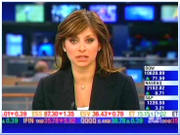Think of this as Volume 11, Number 46 of A-Clue.com, the online newsletter I’ve written since 1997. Enjoy.
In all the to-ing and fro-ing over the financial mess we are in one culprit has gotten off scot-free.
CNBC.
I have been watching CNBC for over a decade now. I’m one of those shut-in executives who are their prime market. Here is what I have learned.
They are always, always wrong.
It’s not that they are trying to be wrong. But what they do is look at the latest trend in order to identify where people should be putting their money. That is what is always wrong.
Call it the stupidity of crowds. Any financial trend or concept immediately stops working once enough people start using it. Always. When everyone is buying something you should be looking to sell. When everyone is selling you should be looking to buy. This is the way to profit, and always has been.
During the late 1990s, however, every guest on CNBC was touting Internet stocks. When they tanked, CNBC guests (and talent) went on to the next hot trend. And the next. And the next. Maria Bartiromo cooed over hedge fund managers like they were her lovers. Once Jim Cramer touted any stock on his Mad Money show, you could be certain some stupid money was about to get shaved, once the smart guys got downwind of it.
The result has been to exacerbate every trend. It’s terribly unhealthy.
The smart guys are just as stupid as anyone else. Hedge funds
depended on complex mathematical models that tried to see where trends
were and get in before they changed, electronically. That works great,
until everyone is doing it. The smart guys’ answer was to use leverage
in order to get the most out of every mini-trend. Worked great, until
everyone was doing it.
Nothing works all the time. Everything stops working once everyone
starts doing it. When they’re talking about it on TV it means enough
are doing whatever it is that you need to be very, very wary. Yet no one
on CNBC ever offered viewers this basic bit of wisdom, which has been
true since the 17th century.
The purpose of regulation, and transparency, is to limit bubbles by
letting every participant in the market know where one might be. Yet
we’ve just spent three decades systematically destroying financial
regulations, de-fanging regulators, and calling it efficiency. No
wonder we wound up with a 19th century style market panic.
And it is in their own reaction to this panic that CNBC has really
proven its callowness. What did their cast say when the bubble burst?
Stop spending, start saving. At one point in the middle of the panic
the Fast Money boys were even telling their viewers to SELL NOW. So consumers went on strike, the market went down further, and now no one trusts anyone or anything. Heckuva job.
The result of all this is that every strategy, even the most
tried-and-tested ones of buy-and-hold or diversification, stopped
working and took investors backward. Will this wisdom ever work again?
Yes. But you already lost your money so you won’t be able to take
advantage.
I’m as guilty as you are, by the way. My retirement fund is worth half what it was. I loaded up on international funds, thinking a U.S. recession would not go overseas, but our Confederate Money turned up everywhere and those other markets weren’t liquid enough to let my fund managers get out. I also bought 100 shares in AIG, at around $60, because a friend was working there.
Here’s another point that really pisses me off. Why is it that every
guest on CNBC, without exception, when asked about trading strategies,
says they saw today’s mistake yesterday and got out? No matter the
subject, that’s the claim. "I didn’t do that. If you had listened to me
you wouldn’t have done that either, but you didn’t so listen to me now."
Bullshit.
Here is the truth. Prices fluctuate. You can’t guarantee results,
ever. You put your money into a casino, you bet on the come line, and
you’re going to get craps as often as not. Scary. It’s like telling
kids there is no Santa or telling old people that death is inevitable.
But it’s the truth.
Worse, real casinos are regulated better than the one where you put your retirement account. If we can get the same transparency on all financial markets you get at Caesar’s Palace, then it will be time to invest again. Slowly, sanely, in a diversified manner.
Oh, and before you consider any investment, one more bit of true wisdom.
Turn off the TV.













Sorry to post this so late, but as a CNBC watcher, this is so true! I’ve never been impressed with anyone on TV. For example, how smart does Lou Dobbs and his ‘business’ show look now after having spent the past decade not on business and fraud, but on immigration? CNBC’s Sqwauk Box Europe is even more inanely desultory than the US version.
Much more informative is to watch international business shows if you have a dish. I’ve subscribed to them all. Chinese stations do a good, but not a thorough job. The French tend to defer to other nations for most business news. The British are fine, but you can barely understand a word they say, their accents are so thick. An entire paragraph is spoken as one word, in less than four seconds. But German TV covers a wide variety of news and business news, devoting (daily) a 30-min. program (w/o commercials) to one topic. And most them don’t take weekends off.
Last thought about CNBC that pissed me off this week. Yesterday, Joe Kernan was telling the rest of us how stupid we were to have bought stocks and not sold them at their height. “Why didn’t people get out of oil when it hit $100! I would have gotten out even earlier! Same goes for wheat; what were they thinking!”
Only problem was, Joe and the rest of the gang (including the clueless biz desk chatterheads on other stations) spent the past decade telling us to BUY! BUY! BUY! NOW! NOW! NOW! They regularly admit their ‘job’ is to cheerlead stocks. And what’s their mantra you so duly noted, Dana? When the economy’s bad is the best time to buy — there’s bargains in those stocks! they plead desperately to viewers. But then they turn right around when the economy’s good AND SAY THE SAME THING, only louder.
Just like politics, it’s best enjoyed at arm’s length.
Sorry to post this so late, but as a CNBC watcher, this is so true! I’ve never been impressed with anyone on TV. For example, how smart does Lou Dobbs and his ‘business’ show look now after having spent the past decade not on business and fraud, but on immigration? CNBC’s Sqwauk Box Europe is even more inanely desultory than the US version.
Much more informative is to watch international business shows if you have a dish. I’ve subscribed to them all. Chinese stations do a good, but not a thorough job. The French tend to defer to other nations for most business news. The British are fine, but you can barely understand a word they say, their accents are so thick. An entire paragraph is spoken as one word, in less than four seconds. But German TV covers a wide variety of news and business news, devoting (daily) a 30-min. program (w/o commercials) to one topic. And most them don’t take weekends off.
Last thought about CNBC that pissed me off this week. Yesterday, Joe Kernan was telling the rest of us how stupid we were to have bought stocks and not sold them at their height. “Why didn’t people get out of oil when it hit $100! I would have gotten out even earlier! Same goes for wheat; what were they thinking!”
Only problem was, Joe and the rest of the gang (including the clueless biz desk chatterheads on other stations) spent the past decade telling us to BUY! BUY! BUY! NOW! NOW! NOW! They regularly admit their ‘job’ is to cheerlead stocks. And what’s their mantra you so duly noted, Dana? When the economy’s bad is the best time to buy — there’s bargains in those stocks! they plead desperately to viewers. But then they turn right around when the economy’s good AND SAY THE SAME THING, only louder.
Just like politics, it’s best enjoyed at arm’s length.
I had to follow-up on this. From Consumerist on Jim Cramer’s terrible track record:
http://consumerist.com/5116676/jim-cramers-advice-slightly-worse-than-a-coin-toss